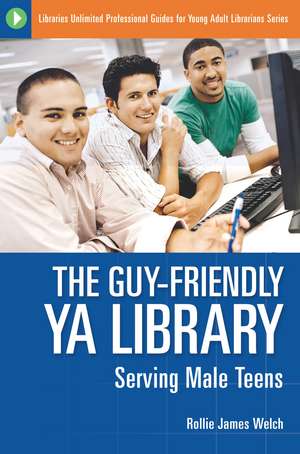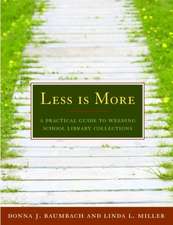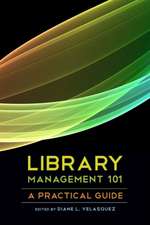The Guy-Friendly YA Library: Serving Male Teens: Libraries Unlimited Professional Guides for Young Adult Librarians Series
Autor Rollie J. Welchen Limba Engleză Paperback – 29 mai 2007 – vârsta până la 17 ani
Din seria Libraries Unlimited Professional Guides for Young Adult Librarians Series
- 18%
 Preț: 260.85 lei
Preț: 260.85 lei - 22%
 Preț: 266.00 lei
Preț: 266.00 lei - 30%
 Preț: 261.85 lei
Preț: 261.85 lei - 22%
 Preț: 257.12 lei
Preț: 257.12 lei - 21%
 Preț: 276.91 lei
Preț: 276.91 lei - 22%
 Preț: 258.33 lei
Preț: 258.33 lei - 22%
 Preț: 249.91 lei
Preț: 249.91 lei - 21%
 Preț: 263.74 lei
Preț: 263.74 lei -
 Preț: 249.54 lei
Preț: 249.54 lei - 14%
 Preț: 311.24 lei
Preț: 311.24 lei - 22%
 Preț: 257.97 lei
Preț: 257.97 lei - 31%
 Preț: 259.42 lei
Preț: 259.42 lei -
 Preț: 259.60 lei
Preț: 259.60 lei - 22%
 Preț: 258.42 lei
Preț: 258.42 lei - 22%
 Preț: 258.69 lei
Preț: 258.69 lei - 18%
 Preț: 261.85 lei
Preț: 261.85 lei - 18%
 Preț: 318.32 lei
Preț: 318.32 lei - 22%
 Preț: 264.88 lei
Preț: 264.88 lei - 22%
 Preț: 261.64 lei
Preț: 261.64 lei - 21%
 Preț: 266.23 lei
Preț: 266.23 lei - 20%
 Preț: 267.60 lei
Preț: 267.60 lei - 23%
 Preț: 256.02 lei
Preț: 256.02 lei - 22%
 Preț: 259.79 lei
Preț: 259.79 lei - 22%
 Preț: 256.95 lei
Preț: 256.95 lei - 22%
 Preț: 257.50 lei
Preț: 257.50 lei - 34%
 Preț: 248.61 lei
Preț: 248.61 lei - 31%
 Preț: 233.46 lei
Preț: 233.46 lei - 32%
 Preț: 257.50 lei
Preț: 257.50 lei - 32%
 Preț: 257.03 lei
Preț: 257.03 lei - 17%
 Preț: 266.00 lei
Preț: 266.00 lei - 17%
 Preț: 266.00 lei
Preț: 266.00 lei - 14%
 Preț: 303.21 lei
Preț: 303.21 lei - 30%
 Preț: 262.32 lei
Preț: 262.32 lei - 18%
 Preț: 262.77 lei
Preț: 262.77 lei
Preț: 257.21 lei
Preț vechi: 331.03 lei
-22% Nou
Puncte Express: 386
Preț estimativ în valută:
49.21€ • 51.39$ • 40.64£
49.21€ • 51.39$ • 40.64£
Carte tipărită la comandă
Livrare economică 15-29 aprilie
Preluare comenzi: 021 569.72.76
Specificații
ISBN-13: 9781591582700
ISBN-10: 1591582709
Pagini: 220
Dimensiuni: 156 x 235 x 16 mm
Greutate: 0.35 kg
Editura: Bloomsbury Publishing
Colecția Libraries Unlimited
Seria Libraries Unlimited Professional Guides for Young Adult Librarians Series
Locul publicării:New York, United States
ISBN-10: 1591582709
Pagini: 220
Dimensiuni: 156 x 235 x 16 mm
Greutate: 0.35 kg
Editura: Bloomsbury Publishing
Colecția Libraries Unlimited
Seria Libraries Unlimited Professional Guides for Young Adult Librarians Series
Locul publicării:New York, United States
Notă biografică
Rollie James Welch is Teen Coordinator of the Cleveland Public Library System. He has worked as a librarian, mostly with teens, for 26 years in both school and public library settings. A frequent presenter at local library workshops throughout his home state of Ohio, Rollie has served on the YALSA book selection committees, Quick Picks for Reluctant Young Adult Readers and Best Books for Young Adults. He has also chaired VOYA's Top Shelf for Middle School Fiction committee. He is a reviewer for Kirkus, VOYA, Library Journal and The Cleveland Plain Dealer newspaper.
Cuprins
IntroductionChapter 1 The Library Staff vs. Guys: Why Can't We Just Get Along?Chapter 2 Understanding Teen MalesChapter 3 Males as Readers: Their Reading HabitsChapter 4 Reading and Boys--Topics of InterestChapter 5 Books for Boys--Genres, Titles and TopicsChapter 6 Engaging Teen Males in Library Programming and Teen Advisory BoardsChapter 7 School Visits and BooktalksChapter 8 Actively and Passively Creating Library Services for Teen MalesConclusionAppendix A Essential Fiction Titles or Series for Teen MalesIndex
Recenzii
For many librarians, this book by the teen coordinator of the Cleveland Public Library system will serve as a valuable eye-opener into the needs and reading tastes of a large proportion of teen boys. . . . Welch provides good coverage of typical teen attitudes, behaviors, and points of view, as well as the typical adult reactions to same. But the book's focus on teen males sets this work apart. Chapters cover reading habits, recommended genres and topics, displays, programming, booktalks and school visits, teen spaces and YA services in general. Welch's suggestions for modifying such things as summer reading clubs, displays, teen advisory boards, and even furnishings so they have more guy appeal are easy and don't require a whole seperate set of services. By simply making librarians aware of what attracts this population, Welch's book could have a broad and potentially profound impact on the way many librarians deliver YA services and the number of young male patrons they are able to recruit as enthusiastic library users.
Starting with the important characteristics of books that appeal to male teens, the author discusses the type of genre reading this group is interested in. . . By discussing what doesn't work for teens, Welch examines how to engage teens through programming and how to develop gender-friendly teen advisory boards.Although other books cover some of this same area, none gives the insights Welch provides for focusing his book on the male teenager. . . . The material in this book ought to be read by any librarian who comes in contact with teens in the library. The author suggests ways for public and school librarians to work together and how school librarians can specifically engage this age group. This book will give the experienced librarian new and fresh ideas, and the new librarian a great strategy to follow in building a guy-friendly library.
Although this book is written for the young adult librarian in a public library, it would be a useful purchase for a secondary school librarian or anyone working with teenagers and wanting to encourage reading in that age group. The author recommends ways teen librarians can work with young adult readers, and also how to reach out to teen readers by involving school teachers and school media people by doing various presentations at schools. Especially for the public young adult librarians, this is a needed resource, for it will help staff relate to young adult males.
Provides some excellent insights, anecdotes and practical suggestions that should help librarians encourage male teenage users. A must read for all public and school librarians who have found themselves struggling to reach this particular audience.
This resource for young adult librarians suggests ways of improving services for teen males. Welch begins by identifying some of the ways that libraries unknowingly alienate teen males and then offers some insight into their reading habits. Subsequent chapters address such topics as teen advisory boards, booktalks, and school visits. A list of fiction titles recommended for teen males is found in the appendix.
Aimed at public libraries, the volume provides tested strategies for reaching out to a greatly misunderstood group of patrons.
If reaching more teen males is a goal, this wonderful and highly readable resource to making libraries more guy-friendly is an excellent place to start. . . . Although the title of the book is straightforward and librarians are clearly the audience, teachers might miss out or steer clear of this book because the title contains the term library. Teachers would be well served to peruse this well-organized and insightful introduction.
Each chapter contains short, easily digestible segments of ideas complete with a list of further reading suggestions. Where applicable, web site suggestions have also been included. An appendix listing 'Essential Fiction Titles or Series for Teen Males' is particularly useful as a quick reference and is followed by a full index. Ultimately however, the book provides some excellent insights, anecdotes and practical suggestions that should help librarians encourage male teenage users. Many of the suggestions are cost free or low cost ideas that will hopefully ensure newly introduced male teens will feel welcome and comfortable in the library. A must read for all public and secondary school librarians who have found themselves struggling to reach this particular audience.
Written primarily for YA librarians, this book provides practical information on understanding the nature of teen males, including their feelings, physical development, interests, and reading choices, and demonstrates how these preferences can be used to enhance library services to these users. . . . The content of this book is important for any librarian working with today's teens and is presented in a way that engages the emotions and is easy to understand. . . . Recommended for librarians wanting to reach out to male teens.
Starting with the important characteristics of books that appeal to male teens, the author discusses the type of genre reading this group is interested in. . . By discussing what doesn't work for teens, Welch examines how to engage teens through programming and how to develop gender-friendly teen advisory boards.Although other books cover some of this same area, none gives the insights Welch provides for focusing his book on the male teenager. . . . The material in this book ought to be read by any librarian who comes in contact with teens in the library. The author suggests ways for public and school librarians to work together and how school librarians can specifically engage this age group. This book will give the experienced librarian new and fresh ideas, and the new librarian a great strategy to follow in building a guy-friendly library.
Although this book is written for the young adult librarian in a public library, it would be a useful purchase for a secondary school librarian or anyone working with teenagers and wanting to encourage reading in that age group. The author recommends ways teen librarians can work with young adult readers, and also how to reach out to teen readers by involving school teachers and school media people by doing various presentations at schools. Especially for the public young adult librarians, this is a needed resource, for it will help staff relate to young adult males.
Provides some excellent insights, anecdotes and practical suggestions that should help librarians encourage male teenage users. A must read for all public and school librarians who have found themselves struggling to reach this particular audience.
This resource for young adult librarians suggests ways of improving services for teen males. Welch begins by identifying some of the ways that libraries unknowingly alienate teen males and then offers some insight into their reading habits. Subsequent chapters address such topics as teen advisory boards, booktalks, and school visits. A list of fiction titles recommended for teen males is found in the appendix.
Aimed at public libraries, the volume provides tested strategies for reaching out to a greatly misunderstood group of patrons.
If reaching more teen males is a goal, this wonderful and highly readable resource to making libraries more guy-friendly is an excellent place to start. . . . Although the title of the book is straightforward and librarians are clearly the audience, teachers might miss out or steer clear of this book because the title contains the term library. Teachers would be well served to peruse this well-organized and insightful introduction.
Each chapter contains short, easily digestible segments of ideas complete with a list of further reading suggestions. Where applicable, web site suggestions have also been included. An appendix listing 'Essential Fiction Titles or Series for Teen Males' is particularly useful as a quick reference and is followed by a full index. Ultimately however, the book provides some excellent insights, anecdotes and practical suggestions that should help librarians encourage male teenage users. Many of the suggestions are cost free or low cost ideas that will hopefully ensure newly introduced male teens will feel welcome and comfortable in the library. A must read for all public and secondary school librarians who have found themselves struggling to reach this particular audience.
Written primarily for YA librarians, this book provides practical information on understanding the nature of teen males, including their feelings, physical development, interests, and reading choices, and demonstrates how these preferences can be used to enhance library services to these users. . . . The content of this book is important for any librarian working with today's teens and is presented in a way that engages the emotions and is easy to understand. . . . Recommended for librarians wanting to reach out to male teens.







